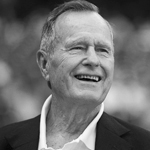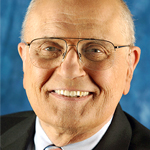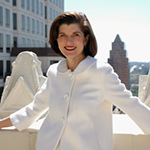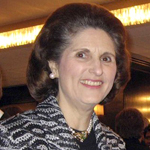 Honorary Co-Chairs
Honorary Co-Chairs
The Honorable George Bush
The Forty-first President of the United States
George Bush was sworn in as president of the United States in January 1989 and served until January 1993. During his term in office, the Cold War ended; the threat of nuclear war was drastically reduced; the Soviet Union ceased to exist, replaced by a democratic Russia with the the Baltic states becoming free; Berlin Wall fell and Germany was reunified with Eastern Europe; and he put together an unprecedented coalition of 32 nations to liberate Kuwait.
Mr. Bush was the first sitting vice president to ascend to the presidency since 1837, and he was also only the second American president to serve a full term without party control in either chamber of Congress. Nevertheless, among the laws President Bush signed into effect were the Americans with Disabilities Act and the Clean Air Act – landmark civil rights and environmental legislation. He also successfully fought for and negotiated the North American Free Trade Agreement (NAFTA), which was later signed into law.
Since leaving office, President Bush has written two books – A World Transformed, co-authored with General Brent Scowcroft, on foreign policy during his administration, and All The Best, a collection of letters written throughout his life. He has visited 56 foreign countries and most of the 50 states, and has helped raise hundreds of millions of dollars for a variety of charitable organizations.
President Bush is a life member of the M. D. Anderson Cancer Center Board of Visitors and served as chairman of the board from 2002 to 2003. He is honorary chairman of the Points of Light Foundation. He takes an active role in the George Bush Presidential Library and Museum and the George Bush School of Government and Public Service, both located on the campus of Texas A&M University. He is co-founder, with former President Bill Clinton, of the Bush-Clinton Katrina Fund, which has raised and distributed more than $100 million to victims of hurricane disasters. This year, United Nations Secretary-General Kofi Annan appointed President Bush special envoy to Southeast Asia for earthquake relief.
Born on June 12, 1924, in Milton, Mass., George Bush became a decorated naval pilot who flew torpedo bombers during World War II. In 1944, he was shot down over the island of Chi Chi Jima and rescued. After graduating Phi Beta Kappa from Yale University in 1948 with a degree in economics, he and his wife Barbara moved to Texas, where he began making his way in the oil business. President Bush’s career in politics and public service began in 1963, when he was elected chairman of the Harris County (Texas) Republican Party. He was elected in 1966 to the U.S. House of Representatives from Texas’ Seventh District and served two terms. Before serving as vice president from 1981 to 1989 under Ronald Reagan, Mr. Bush held a number of senior-level positions, including U.S. ambassador to the United Nations, chairman of the Republican National Committee, chief of the U.S. Liaison Office in China, and director of Central Intelligence.
George and Barbara Bush have five children and 17 grandchildren. Their oldest son, George W., was sworn in as the 43rd president of the United States in 2001 and began his second term in January 2005. Their son Jeb has been governor of Florida since 1999. The Bushes have been married 61 years and reside in Houston, Texas, and Kennebunkport, Maine.

The Honorable Julian Bond
Julian Bond is a leader of the American Civil Rights Movement. While a student at Morehouse College in Atlanta, he helped found the Student Nonviolent Coordinating Committee (SNCC) and served as communications director. He was elected Board Chairman of the NAACP in 1998. Bond graduated from Morehouse and helped found the Southern Poverty Law Center (SPLC). He was the organization's president from 1971 to 1979.
Bond was elected to the Georgia House of Representatives in 1965. White members of the House refused to seat him because of his opposition to the Vietnam War. In 1966, the United States Supreme Court ruled that the House had denied Bond his freedom of speech and had to seat him. From 1965 to 1975, he served in the Georgia House and served six terms in the Georgia Senate from 1975-86.
Today Bond is a Distinguished Visiting Professor at American University in Washington, D.C., and a Professor in the history department at the University of Virginia.

The Honorable Julián Castro
A San Antonio native, Mayor Julián Castro is the youngest mayor of a Top 50 American city. First elected on May 9, 2009, Mayor Castro was handily re-elected to a third term in 2013.
Throughout his tenure, Mayor Castro has focused on attracting well-paying jobs in 21st century industries, positioning San Antonio to be a leader in the New Energy Economy and raising educational attainment across the spectrum.
In March 2010, Mayor Castro joined executives from Google and Twitter in being named to the World Economic Forum’s list of Young Global Leaders. Later that year, Time magazine placed him on its “40 under 40” list of rising stars in American politics. Mayor Castro also is a member of the Inter-American Dialogue, an Aspen Institute-Rodel Fellow and serves on the board of the LBJ Foundation.
Mayor Castro earned his undergraduate degree from Stanford University with honors and distinction in 1996 and a juris doctorate from Harvard Law School in 2000. In 2001, at the age of 26, Castro became the youngest elected city councilman at that time in San Antonio history.

The Honorable John Dingell
John D. Dingell proudly represents Michigan’s Twelfth Congressional District and is the current Dean of the House of Representatives. His first fights were for civil rights, clean water, Medicare, and American workers' rights, and he continues to fight for protecting American jobs, improving the safety of our food and drug supply, strengthening consumer product safety, implementing pipeline safety measures and scores more.
An avid conservationist and outdoorsman, Dingell wrote the Endangered Species Act, the 1990 Clean Air Act, the Safe Drinking Water Act, and legislation to build North America's first international wildlife refuge.
As a lifetime advocate for protecting public health, he authored the Affordable Care Act, the Patient's Bill of Rights, the Children's Health Insurance Program, the Mammography Quality Standards Act, the FDA Food Safety Modernization Act, the Prescription Drug User Fee Act, and others. Dingell continues to be a champion of working across the Congressional aisle.

Ms. Luci Baines Johnson
Luci Baines Johnson, the younger daughter of Lady Bird and Lyndon Baines Johnson, is the Founder and Limited Partner of LBJ Family Wealth Advisors, Ltd., a multi-family office managing and helping transition family wealth from one generation to the next. Ms. Johnson is also founder of BusinesSuites, a nationwide office business service center.
A graduate of St. Edwards University with numerous honors, Ms. Johnson is a Trustee Emeritus of Boston University, Seton Medical Center’s Foundation and Dell Children’s Medical Foundation. She currently serves on the board of The LBJ Foundation, The Lady Bird Johnson Wildflower Center, SafePlace and The University of Texas MD Anderson Cancer Center.
Ms. Johnson’s most precious career is her family. She is married to Ian Turpin and has four grown children, Lyndon, Nicole, Rebekah, and Claudia; one stepson, Stuart; and 13 treasured grandchildren.

The Honorable John Lewis
Often called "one of the most courageous persons the Civil Rights Movement ever produced," John Lewis has dedicated his life to protecting human rights, securing civil liberties, and building what he calls "The Beloved Community” in America. His dedication to the highest ethical standards and moral principles has won him the admiration of many of his colleagues on both sides of the aisle in the United States Congress.
He was born the son of sharecroppers on February 21, 1940, outside of Troy, Alabama. He grew up on his family's farm and attended segregated public schools in Pike County, Alabama. As a young boy, he was inspired by the activism surrounding the Montgomery Bus Boycott and the words of the Rev. Martin Luther King Jr., which he heard on radio broadcasts. In those pivotal moments, he made a decision to become a part of the Civil Rights Movement. Ever since then, he has remained at the vanguard of progressive social movements and the human rights struggle in the United States.
As a student at Fisk University, John Lewis organized sit-in demonstrations at segregated lunch counters in Nashville, Tennessee. In 1961, he volunteered to participate in the Freedom Rides, which challenged segregation at interstate bus terminals across the South. During the height of the Movement, from 1963 to 1966, Lewis was named Chairman of the Student Nonviolent Coordinating Committee (SNCC), which he helped form. By 1963, he was dubbed one of the Big Six leaders of the Civil Rights Movement. At the age of 23, he was an architect of and a keynote speaker at the historic March on Washington in August 1963. In 1964, John Lewis coordinated SNCC efforts to organize voter registration drives and community action programs during the Mississippi Freedom Summer.
The following year, Lewis helped spearhead one of the most seminal moments of the Civil Rights Movement. Hosea Williams, another notable Civil Rights leader, and John Lewis led over 600 peaceful, orderly protestors across the Edmund Pettus Bridge in Selma, Alabama on March 7, 1965. They intended to march from Selma to Montgomery to demonstrate the need for voting rights in the state. The marchers were attacked by Alabama state troopers in a brutal confrontation that became known as "Bloody Sunday." News broadcasts and photographs revealing the senseless cruelty of the segregated South helped hasten the passage of the Voting Rights Act of 1965.
Despite more than 40 arrests, physical attacks and serious injuries, John Lewis remained a devoted advocate of the philosophy of nonviolence. After leaving SNCC in 1966, he continued his commitment to the Civil Rights Movement as Associate Director of the Field Foundation, Director of the Voter Education Project (VEP) and as a member of the Atlanta City Council.
He was elected to Congress in November 1986 and has served as U.S. Representative of Georgia's Fifth Congressional District since then. He is Senior Chief Deputy Whip for the Democratic Party in leadership in the House, a member of the House Ways & Means Committee, a member of its Subcommittee on Income Security and Family Support, and Ranking Member of its Subcommittee on Oversight. John Lewis holds a B.A. in Religion and Philosophy from Fisk University, and he is a graduate of the American Baptist Theological Seminary, both in Nashville, Tennessee.
John Lewis is the recipient of numerous awards from imminent national and international institutions, including the highest civilian honor granted by President Barack Obama, the Medal of Freedom, the Lincoln Medal from the historic Ford’s Theatre, the Golden Plate Award given by the Academy of Excellence, the Preservation Hero award given by the National Trust for Historic Preservation, the Capital Award of the National Council of La Raza, the Martin Luther King, Jr. Non-Violent Peace Prize, the President’s Medal of Georgetown University, the NAACP Spingarn Medal, the National Education Association Martin Luther King Jr. Memorial Award, and the only John F. Kennedy "Profile in Courage Award" for Lifetime Achievement ever granted by the John F. Kennedy Library Foundation.
John Lewis is the co-author of a #1 New York Times bestselling graphic novel MARCH. He is also the author of Across That Bridge: Life Lessons and a Vision for Change, winner of the 2012 NAACP Image Award for Best Literary Work-Biography.

Mrs. Lynda Johnson Robb
Robb fondly lists her current profession as “professional volunteer.” She has served many organizations, always focusing on the condition of children and women. Robb became a founding member of the Board Reading is Fundamental Washington, D.C., in 1968 and has been on the board ever since. From 1996 until 2001, she served as the Chairman of the RIF Board of Directors. In addition to her work on behalf of RIF, she is president of the National Home Library Foundation. She also is a member of the board of the Lyndon Baines Johnson Library Foundation.
She attended George Washington University and is an honors graduate of the University of Texas, where she earned a Bachelor of Arts degree in history. In 1992, she was inducted in the Phi Beta Kappa Society, Alpha Chapter of the District of Columbia.
Robb is the daughter of President Lyndon Baines Johnson and Claudia Taylor “Lady Bird” Johnson. She is married to former Virginia Governor and U.S. Senator Charles S. Robb, is the mother of three daughters, and has three grandchildren.

The Honorable Margaret Spellings
Margaret Spellings is the president of the George W. Bush Presidential Center. She oversees all aspects of Bush Foundation activities, including leadership of the George W. Bush Institute, management of George W. Bush Presidential Center business operations, and collaboration with the National Archives and Records Administration, which operates the George W. Bush Presidential Library and Museum.
Previously Spellings was president and CEO of Margaret Spellings and Company, a Washington, D.C. consulting firm that provided strategic guidance to philanthropic and private sector organizations. She also served as a senior advisor to the U.S. Chamber of Commerce and was president of the U.S. Chamber of Commerce Foundation.
Prior to that, Spellings served in a variety of positions in the Bush Administration. She is the longest-serving staff member to President George W. Bush. She served as U.S. Secretary of Education from 2005 to 2009. In that role, she oversaw an agency with a nearly $70 billion budget and more than 10,000 employees and contractors. As a member of the President’s Cabinet, she led the implementation of the No Child Left Behind Act (NCLB), a historic national initiative to provide enhanced accountability for the education of 50 million U.S. public school students.
As White House Domestic Policy Advisor, from 2001 to 2005, she managed the development of the President’s domestic policy agenda. Her achievements include oversight of the development of the U.S. President’s Emergency Plan for AIDS Relief (PEPFAR), the development of a comprehensive immigration plan to ensure long-term economic stability and to secure U.S. borders, and numerous other initiatives on health and human services, transportation, labor, justice and housing.
She graduated from the University of Houston with a bachelor's degree in political science.

The Honorable Andrew J. Young
Ambassador Andrew Young was a key confidant and strategist to Dr. Martin Luther King, Jr. In 1972 he was elected to represent Georgia's 5th district, the first African-American elected from the South since Reconstruction. He was appointed by President Jimmy Carter to serve as the U.S. Ambassador to the United Nations, the first African-American to do so. In that role, Ambassador Young established the framework for international negotiations that led to democracy in several nations in Southern Africa.
He later served as Mayor of Atlanta, bringing jobs and seventy billion dollars in private investment to the City during a recession. Ambassador Young's leadership, vision and global reputation were instrumental in bringing the Centennial Olympic Games to Atlanta in 1996. He chairs the Andrew Young Foundation, promoting his vision of peace, prosperity and inclusion through leadership development and the production documentaries. He retired from GoodWorks International, an international business consulting firm he co-founded following his 80th birthday.
His many awards include the Presidential Medal of Freedom, the NAACP’s Springarn Medal, the Olympic Order and France’s Legion d’honneur, the nation’s greatest honor, as well as more than 100 honorary degrees. He serves on a number of boards including: the Martin Luther King Center for Non-Violent Social Change; the United Nations Foundation; Morehouse College and the Andrew Young School for Policy Studies at Georgia State University.
Ambassador Young’s critical contributions to American life and history were celebrated in 2011 with a Lifetime Emmy Award and the placement of his portrait on permanent exhibit of the Smithsonian’s National Portrait Gallery. Ambassador Young is married to civic leader Carolyn McLain Young. He is the father of 4 and has 8 grandchildren.
Cornerstones of Civil Rights
The Civil Rights Summit also includes a special exhibit, “The Cornerstones of Civil Rights,” highlighting civil rights legislation passed during the presidencies of Abraham Lincoln and Lyndon Baines Johnson. On display will be:
- The 13th Amendment Resolution which ended slavery, signed by President Lincoln
- Original documents of the Civil Rights Act of 1964 and the Voting Rights Act of 1965
- A lithography copy of Abraham Lincoln’s final draft of the Emancipation Proclamation
- Editorial cartoons that portray Lincoln and Johnson as partners “on the road to equal rights”
- Two hats owned and worn by the two presidents – the Resistol cowboy hat that accentuated LBJ’s Texas roots, and the “stovepipe” hat that has become Lincoln’s trademark
The exhibit will be open to the public and on display in the Great Hall of the LBJ Presidential Library April 1 – April 30, 2014.
About the Library
The mission of the LBJ Presidential Library is to preserve and protect the historical materials in the collections of the library and make them readily accessible; to increase public awareness of the American experience through relevant exhibitions and educational programs; to advance the LBJ Library's standing as a center for intellectual activity and community leadership while meeting the challenges of a changing world.
Situated on a 30-acre site on The University of Texas campus in Austin, Texas, the Library houses 45 million pages of historical documents, 650,000 photos and 5,000 hours of recordings from President Johnson's political career, including about 643 hours of his recorded telephone conversations.
The Lyndon Baines Johnson Library and Museum is one of 13 Presidential Libraries administered by the National Archives and Records Administration.
Friends of the LBJ Library
We invite you to support the LBJ Presidential Library by joining the Friends of the Library as an annual member. Membership has its rewards-every level offers unique benefits, including special access to speakers and museum exhibits. Membership also provides vital support which allows the Library to preserve our historical collections, present innovative exhibits, and provide community outreach. Learn more about the Friends and become a member today!
Future Forum
Future Forum exists to inform, engage, and inspire the doers of today and the builders of tomorrow. LBJ Future Forum is a public policy discussion forum that provides thought leadership through compelling programs and activities, inspiring members to pursue civic engagement. Future Forum is known and recognized for its programs and leadership. Learn more about Future Forum.